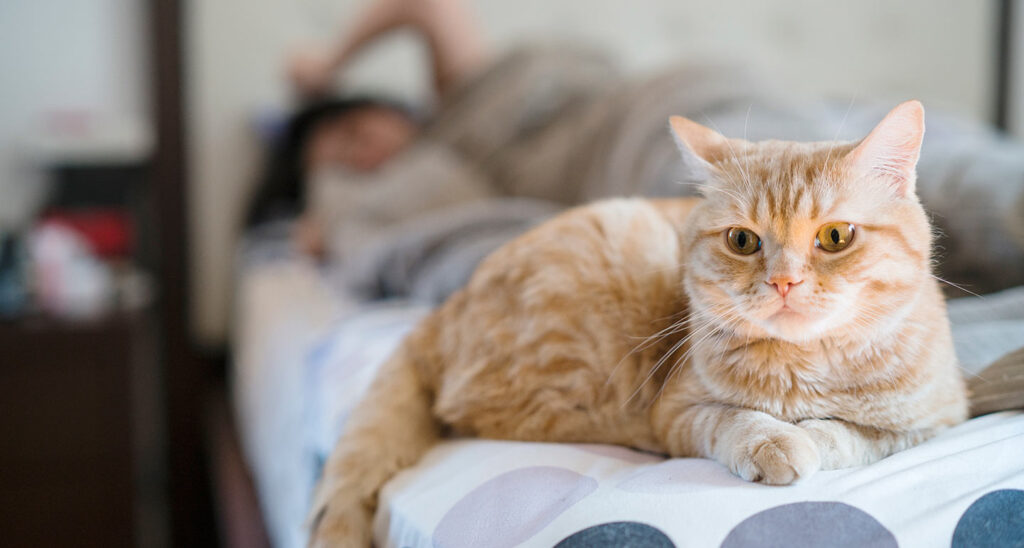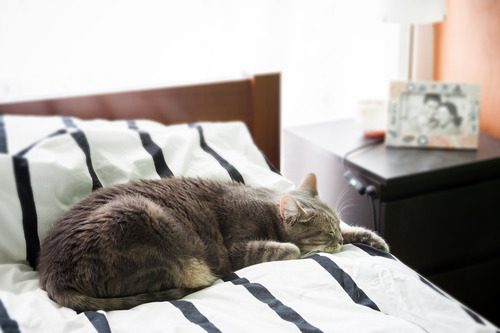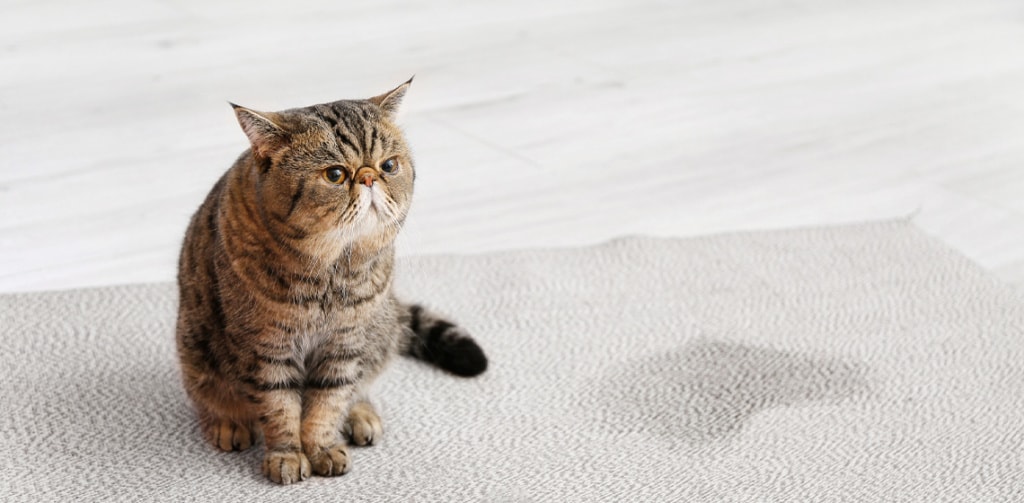
Understanding the Behavior of Cats
Why Do Cats Pee on the Bed, understanding their behavior can be both fascinating and challenging. Many cat owners find themselves puzzled by their cats’ urinary habits and territory-marking behaviors. By delving into these topics, we can unravel the reasons behind why cats pee on beds and develop strategies to address the issue.
Feline Urinary Issues
Urinary issues in cats are not uncommon, and they can stem from a variety of medical conditions. For instance, urinary tract infections (UTIs), bladder stones, or even kidney problems can cause increased urination or difficulty urinating. An observant pet owner might notice their cat straining to urinate, spending an excessive amount of time in the litter box, or even showing signs of pain when going to the bathroom.
Some common indicators of urinary issues include:
- Frequent trips to the litter box
- Blood in urine
- Crying out while urinating
- Licking the genital area excessively
As an anecdote, a friend of mine was distressed when their cat suddenly began urinating outside the litter box. After a visit to the veterinarian, they discovered that the cat had developed bladder stones, which were causing discomfort and prompting the unwanted behavior.
Regular vet check-ups can help catch these issues early, allowing for prompt treatment.
Marking Territory
Another common reason why cats may pee on the bed relates to their instinctual need to mark their territory. Cats possess scent glands in their urine, and by urinating on certain spots, they are asserting their dominance or ownership over that area. This behavior can be especially pronounced in multi-cat households, where competition for resources can lead to increased territorial disputes.
Here’s how to identify if your cat is marking territory:
- They urinate in small amounts in various places, rather than emptying their bladder.
- The urination occurs in prominent areas, such as the bed or furniture.
- You may notice an increased frequency of this behavior during stressful changes, like moving homes or introducing a new pet.
Understanding these motivations can provide valuable insights into a cat’s behavior, offering a clearer path toward solutions. If your cat is marking territory, it may be helpful to provide additional litter boxes, or even consult with a veterinarian or animal behaviorist to address any underlying issues.
Reasons Why Cats Pee on the Bed
Understanding why cats pee on the bed can be tricky, as it often combines both medical and behavioral factors. By examining these causes, cat owners can better address the problem and help their furry friends.
Medical Causes Why Do Cats Pee on the Bed
If a cat is peeing on the bed, the first step should always be to rule out medical issues. Various health problems can lead to changes in urination habits, including:
- Urinary Tract Infections (UTIs): These are painful for cats and can result in frequent urination or accidents outside the litter box.
- Bladder Stones: Similar to UTIs, these can cause discomfort and lead to inappropriate urination.
- Kidney Disease: This condition may cause increased thirst and urination, leading to accidents.
- Diabetes: This medical issue can result in excessive urination and thirst, causing cats to lose control occasionally.
I once had a colleague whose cat began peeing on the bed after a change in diet. Concerned that it could be a urinary issue, they rushed her to the vet, only to find that she had developed a UTI. With treatment, the behavior resolved quickly. For any cat displaying abnormal urination patterns, a vet visit should be the first course of action.
Behavioral Issues
Once medical causes have been ruled out, it’s time to consider behavioral factors that could lead cats to urinate on the bed. Here are some common behavioral issues to keep in mind:
- Stress and Anxiety: Changes in the cat’s environment, such as moving, a new pet, or even a new family member, can trigger stress that may lead to inappropriate urination.
- Territorial Marking: As previously discussed, cats may mark their territory, particularly in multi-cat households.
- Litter Box Aversion: Sometimes a cat may associate the litter box with negative experiences, like a change in litter type or a dirty box, and might choose an alternative spot.
For instance, when my friend’s cat started peeing on their bed, they discovered that the litter box had become too dirty with multiple cats sharing it. Once they added more boxes and cleaned them regularly, the unwanted behavior stopped.
By understanding both medical and behavioral causes, cat owners can take proactive steps to ensure their pets feel comfortable and secure, ultimately reducing the chances of bed accidents.

Signs to Watch for in a Cat’s Behavior
Paying attention to a cat’s behavior can provide valuable insights into their health and emotional well-being. Changes in urination habits and differentiating between spraying and urinating are critical aspects that every cat owner should monitor.
Changes in Urination Habits
Changes in how often or where a cat urinates can be significant indicators of underlying issues. Cat owners should be on the lookout for these troubling signs:
- Increased Frequency: If your cat suddenly starts using the litter box more frequently or has accidents, it could indicate a urinary tract infection or other medical concerns.
- Straining or Discomfort: Pay attention if your cat seems to have difficulty urinating, cries out, or spends too long in the litter box.
- Blood in Urine: This is a serious sign that should prompt an immediate veterinary visit.
- Accidents in Unusual Places: If your cat decides to pee outside the litter box, especially in high-stress areas like the bed, it’s crucial to figure out why.
When my own cat began to frequently visit the litter box at odd hours and even leave little “puddles” in corners, I knew something was off. After a vet visit, it turned out to be a mild case of a UTI. Early detection made all the difference!
Spraying vs. Urinating
It’s also essential to understand the difference between spraying and regular urination. While both involve the release of urine, their purposes and behaviors differ significantly:
- Spraying: This is when a cat releases a small amount of urine on vertical surfaces, like walls or furniture. Spraying is often a territorial marking behavior and can be triggered by stress or the presence of other animals.
- Urinating: This typically involves the cat emptying its bladder in horizontal areas, usually in the litter box or inappropriate spots if they are upset or unwell.
If you’re not sure whether your cat is spraying or urinating, consider the following:
| Behavior | Spraying | Urinating |
|---|---|---|
| Amount | Small amounts | Larger bladder-emptying events |
| Location | Vertical surfaces | Horizontal surfaces |
| Purpose | Territory marking | Relieving himself |
Recognizing these subtle distinctions can help you address the behavior appropriately and determine if it’s time to consult a vet or rethink your cat’s environment. Keeping a close eye on these signs can lead to early intervention and a happier, healthier cat.

Preventive Measures to Avoid Bed Peeing
Understanding the reasons behind why cats pee on the bed is crucial, but taking preventive measures is equally important. With some proactive steps, cat owners can create a comfortable environment that minimizes the chances of inappropriate urination.
Regular Vet Check-Ups
One of the most effective ways to prevent urination issues is by scheduling regular veterinary check-ups for your cat. Routine visits can help detect potential health concerns before they evolve into more significant problems. Here’s why these check-ups are key:
- Early Detection of Health Issues: Regular vet visits can catch conditions like urinary tract infections or kidney disease, which might lead to inappropriate urination.
- Vaccinations and Preventive Care: Keeping your cat’s vaccinations up to date can prevent illnesses that may contribute to behavioral changes.
- Behavioral Consultations: Vets can provide advice on handling specific behavioral issues that could lead to urination problems.
I remember when my cousin neglected to take her cat for regular check-ups. It wasn’t until the cat was exhibiting erratic behavior, including inappropriate urination, that she took action. The vet identified a bladder infection, which was easily treated, proving the importance of regular vet visits.
Environmental Enrichment
Creating a stimulating environment is another crucial step in preventing your cat from peeing on the bed. Cats thrive in environments where they can engage in natural behaviors such as climbing, scratching, and hiding. Here are some ideas to enrich your cat’s space:
- Vertical Spaces: Install cat trees or shelves that allow your cat to climb and observe their surroundings from a height.
- Interactive Toys: Provide toys that stimulate your cat mentally and physically—think feather wands, puzzle feeders, or laser pointers.
- Multiple Litter Boxes: If you have multiple cats, ensure there are enough litter boxes (the rule of thumb is one per cat plus one extra). This can minimize territorial disputes.
- Safe Retreats: Create cozy hiding spaces where your cat can retreat when feeling stressed, such as a designated cat bed or a quiet corner.
By enriching your cat’s environment and ensuring their health is monitored, you can create a happy, balanced atmosphere. Taking these preventive measures can significantly reduce the chances of your furry friend choosing the bed as their bathroom, leading to a more harmonious living space for both of you.

Dealing with a Cat that Pees on the Bed
Finding out that your cat has peed on the bed can be frustrating and disheartening. However, it’s essential to address the issue calmly and effectively. By following some cleaning tips and knowing when to seek professional help, you can manage this behavior and help your feline friend feel secure.
Cleaning Tips
When cleaning cat urine, it’s important to use products that eliminate odor fully. Cats have a sensitive sense of smell, and if the scent remains, they may return to that spot. Here are some effective cleaning tips:
- Act Quickly: The sooner you clean the area, the less chance there is for lingering odors.
- Use an Enzymatic Cleaner: These cleaners break down the proteins in urine, effectively neutralizing the smell. Look for brands specifically designed for pet messes.
- Blot, Don’t Rub: Blot the area with paper towels or cloths instead of rubbing, as this can spread the urine further into the fabric.
- Wash Bedding Thoroughly: For bed linens, wash them in hot water with a good detergent and add a cup of white vinegar to help deodorize.
- Use a Blacklight: If you’re unsure where the urine has soaked in, a blacklight can help spot dried urine stains, allowing for thorough cleaning.
A friend of mine had a difficult time with her cat who began peeing on her bed after moving to a new apartment. She found that using an enzymatic cleaner effectively removed the odors, leading to fewer accidents as her cat felt less compelled to mark territory.
Seeking Professional Help
If cleaning doesn’t resolve the problem and accidents persist, it may be time to seek professional help. Here are some signs that indicate consulting a vet or a cat behaviorist:
- Persistent Issues: If the bed-wetting continues despite your best cleaning efforts and environmental adjustments, it could indicate a deeper issue.
- Health Concerns: If your cat is exhibiting other signs of distress or illness, a vet visit is warranted to rule out any underlying health problems.
- Behavioral Problems: A certified animal behaviorist can provide insights into stress-related behaviors and help develop strategies tailored to your cat.
In my experience, addressing my cat’s urination issues became much simpler after seeking advice from a behaviorist. They suggested introducing new toys and making small environmental changes that helped reduce her anxiety.
By being proactive with cleaning and knowing when to seek professional guidance, cat owners can effectively manage bed peeing behavior and create a happier, healthier home for both themselves and their feline companions.

